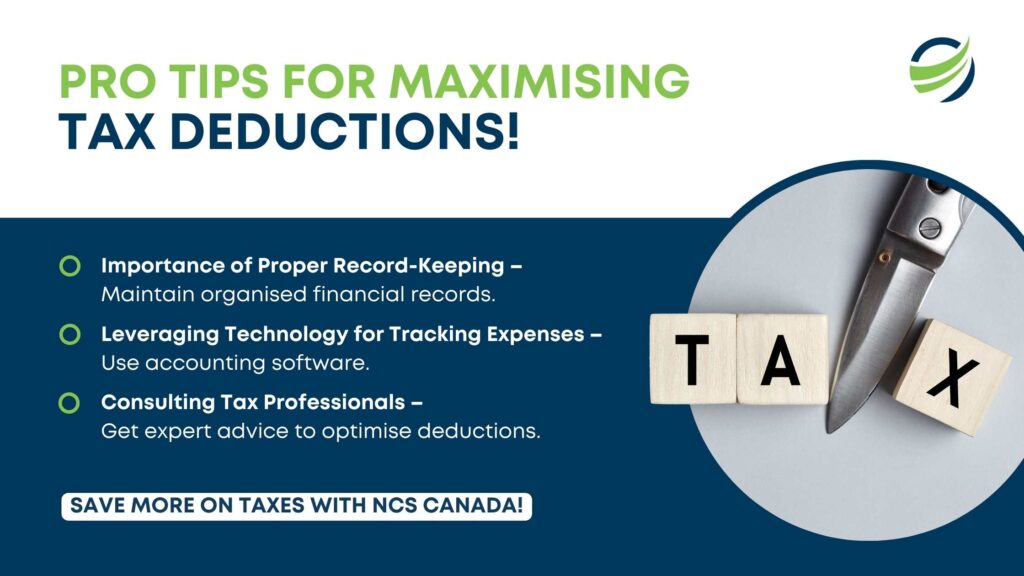Tax Deductions for Small Businesses in Canada
Introduction:
Running a small business in Canada comes with many expenses, but fortunately, there are small business tax deductions that can help reduce your tax burden. Every dollar saved in taxes is a dollar reinvested into your business. But do you know exactly what you can write off as a business owner? Many business owners miss out on valuable deductions simply because they don’t know what qualifies. In this guide, we’ll walk you through everything you need to know about tax write-offs for small business Canada, helping you keep more of your hard-earned money.
What Are Tax Deductions?
Tax write-offs for small business lower your taxable income by allowing you to subtract eligible business expenses from your total revenue. This means you only pay taxes on your net income, ultimately reducing your overall tax bill. The Canada Revenue Agency (CRA) provides clear guidelines on what can be claimed, ensuring that only necessary and reasonable expenses related to running your business are deducted. Outsourcing tax preparation can help take the load off, allowing you to focus on growing your business while the tax details are handled.
Understanding Business Expenses:
Business expenses are costs incurred in running your business. If an expense is directly related to generating income and is reasonable for your industry, chances are it’s deductible. However, you must keep proper documentation to support your claims in case of an audit.
Categories of Business Expenses:
Business expenses fall into several categories, including:
- Operating Expenses – Everyday costs to keep your business running, like rent and utilities.
- Capital Expenses – Long-term investments such as equipment and vehicles.
- Startup Costs – Initial expenses incurred before your business starts making money.
The Ultimate List of Small Business Tax Deductions in Canada:
1. Office-Related Expenses
Running a business often means investing in your workspace, whether it’s at home or in an office. You may be able to deduct:
- Home Office Expenses – If you work from home, a portion of your rent, utilities, and internet costs can be deducted.
- Office Supplies – Paper, pens, printer ink, and other everyday necessities.
- Office Furniture and Equipment – Desks, chairs, and computers qualify but must follow CRA depreciation rules.
2. Property Expenses
Owning or leasing a business space comes with several deductible costs, including:
- Business Rent – The cost of leasing an office, retail store, or warehouse.
- Property Taxes – If you own commercial property, you can deduct property taxes.
- Insurance – Business insurance premiums for liability, property, and more.
- Maintenance and Repairs – Keeping your workspace in good shape is a necessary expense.
3. Transportation and Travel Expenses
If you use a vehicle or travel for business purposes, you can claim:
- Business Vehicle Expenses – Gas, insurance, and maintenance costs for business use.
- Fuel Costs – The portion used for business travel.
- Maintenance and Repairs – Oil changes, tire replacements, and upkeep.
- Vehicle Depreciation – You can claim depreciation for vehicles used for business.
- Travel Expenses – Flights, hotels, and business-related travel costs.
- Meals and Entertainment – If you’re meeting a client for dinner, 50% of the cost is deductible.
- Lodging and Transportation – Hotel stays and taxi/Uber rides for business trips.
- Convention and Conference Fees – Registration fees for industry events.
4. Employee Expenses
Hiring employees comes with costs, many of which are deductible:
- Salaries, Wages, and Benefits – Payroll expenses for employees.
- Private Health Plans – Premiums paid for employees’ health insurance.
- Professional Development and Training – Courses and certifications for employees.
5. Marketing and Advertising
Getting your business noticed costs money, but it can be deducted:
- Promotional Campaigns – Flyers, billboards, and other marketing efforts.
- Social Media Advertising – Facebook, Instagram, and Google Ads.
- Traditional Media (Print, Radio, TV) – Newspaper ads, radio spots, and TV commercials.
6. Professional and Administrative Fees
Some services are essential for running your business and are deductible:
- Accountant and Legal Fees – Hiring professionals for tax filing or legal advice can be a smart investment. Many small businesses benefit from outsourced accounting to ensure compliance and maximise deductions. Partnering with a trusted outsourced bookkeeping service also streamlines payroll, reporting, and expense tracking helping you stay organised year-round.
- Licensing and Membership Dues – Business licenses and trade organisation memberships.
- Management and Administration Costs – Costs for bookkeeping, payroll software, and other administrative tools.
7. Financing and Banking Costs
Your business banking and financing fees can also be deducted:
- Interest and Bank Charges – Interest on business loans and overdraft fees.
- Loan Payments (Interest Only) – The interest portion of your loan is deductible.
8. Miscellaneous Deductions
Other deductible expenses include:
- Start-Up Costs – Business registration fees, incorporation costs, and initial advertising.
- Charitable Contributions – Donations to registered charities.
- Education and Skill Development – Courses to improve business operations.
- Bad Debts – If a customer doesn’t pay you, you may be able to write it off.

Lesser-Known Tax Deductions for Small Businesses:
There are a few small business tax deductions Canada that many business owners overlook:
- Energy-Efficient Equipment Deductions – Rebates for eco-friendly business upgrades.
- Moving Expenses for Business Purposes – If you relocate your business, you can deduct moving costs.
- Investments and Retirement Contributions – Certain business-related investment expenses qualify.
- Foreign-Earned Income Exclusion – If you operate internationally, you may be able to deduct foreign-earned income.
Expenses You Can’t Deduct:
Not all expenses qualify as deductions. Some common non-deductible expenses include:
- Personal Living Expenses – Groceries, personal rent, and clothing don’t count.
- Fines and Penalties – Government-imposed fines are not deductible.
- Expenses Without Proper Documentation – Always keep receipts and records.
How to File Small Business Taxes and Claim Deductions:
Step-by-Step Guide to Filing Taxes Online in Canada
- Gather all relevant financial records.
- Use accounting software or consult a tax professional.
- File online through the CRA’s My Business Account.
- Submit tax forms and claim applicable deductions.
Necessary Documentation for Claiming Deductions
- Receipts and invoices
- Bank statements
- Mileage logs for vehicle deductions
- Payroll records
Common Mistakes to Avoid
- Failing to track expenses properly
- Overestimating deductions
- Missing tax deadlines
Key Takeaways:
Understanding small business tax deductions in Canada can save you thousands of dollars each year. By knowing what you can write off as a business owner and maintaining detailed records, you can maximise your tax savings and avoid costly mistakes. Not sure if you’re claiming everything you’re entitled to? An outsourced tax professional can help ensure you take full advantage of available deductions.
FAQs:
- What expenses can I claim as a small business owner in Canada?
As a small business owner in Canada, you can claim various expenses like office supplies, employee wages, travel costs, marketing expenses, property taxes, and vehicle maintenance, as long as they are directly related to your business operations. - Can I deduct my home office expenses?
Yes, if you work from home, you can deduct a portion of your rent, utilities, and internet costs. The deduction depends on the size of your home office and how much of the home is used for business purposes, as outlined by the CRA. - Are meals and entertainment costs deductible for business purposes?
Yes, meals and entertainment expenses for business meetings are deductible, but only 50% of the cost qualifies. This includes client dinners and other business-related entertainment expenses. - How can I claim travel expenses for my business?
You can deduct travel expenses such as flights, hotels, meals, and transportation when traveling for business. Make sure to keep receipts and records, and only claim expenses directly related to your business activities. - Can I write off training and professional development costs?
Yes, the cost of training and professional development for yourself or employees is deductible. This includes course fees, certifications, and workshops that enhance business skills or professional growth related to your industry. - What are some lesser-known deductions for small businesses?
Lesser-known deductions include energy-efficient equipment upgrades, business-related moving expenses, contributions to retirement plans, and even certain foreign-earned income if your business operates internationally. Make sure to check eligibility with the CRA.







